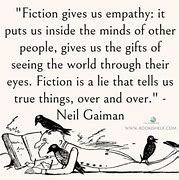A couple of years ago, probably at one of my first book signings for Sarah’s Legacy, a woman asked a question that stunned me. “Why would you want to write fiction? It’s all lies anyway.”
I don’t know what answer I gave, but I know the answer I’d give now. “Why did Jesus, the Master Storyteller, use parables when He taught?”
While parables may not technically be labeled fiction, they are fictitious stories that teach a lesson, and “not true,” in that they didn’t happen. In the same way, Christian fiction at its best is a story that, in some subtle way, teaches a lesson.
I’m a firm believer that sometimes a point made using fiction is more likely to be received than if told in a more direct fashion. A reader may find that he/she relates to a particular character in a story and sees something about themselves they hadn’t noticed before. The Holy Spirit is able to bring about conviction through fiction just as well as through non-fiction.
A radio talk show host who interviewed me after I began writing fiction basically acknowledged that he didn’t waste his time reading fiction because he didn’t think he could learn anything from it. I emphatically disagree and the comments I’ve had from my readers have proved this man wrong time and again.
One woman who hadn’t been raised in a Christian home told me Sarah’s Legacy and Sarah’s Legacy Shared helped to build a Christian foundation that she had missed growing up. One of my granddaughters, raised in a definitely Christian home, also told me she had learned from my fiction series.
The background and life experiences of an author also contribute to what can be gained from reading their fiction books. In my case, my training in temperament therapy and years of experience in counseling were a wonderful foundation for building characters in the writing of my Christian fiction.
As I did research for this blog, I found some interesting information on Google.
Fiction is lies; we’re writing about people who never existed and events that never happened when we write fiction (not true of historical fiction)… But it has to have a truth at the core of it.
What is the difference between a lie and fiction? A Iie pretends to be the truth; fiction is sincere about being the result of someone’s imagination.
Fiction is a socially agreed upon exchange where someone tells a story and someone else knowingly receives the story as fiction, for the purposes of entertainment. Everyone is on the same page; no one in this scenario is taken advantage of.
A lie, on the other hand is when the teller takes advantage of the other person. In this scenario, all the social cues indicate that the other person expects truth, not fiction, in this exchange. The other person has been led to expect factual information…
All very interesting. And all of this to say that I’m going to begin having Fiction Fridays now and then on my blog, posting excerpts from my Historical Fiction Sarah’s Legacy series. I hope you’ll enjoy them and discover for yourself why someone might choose to write fiction!
